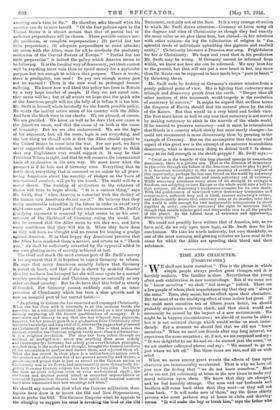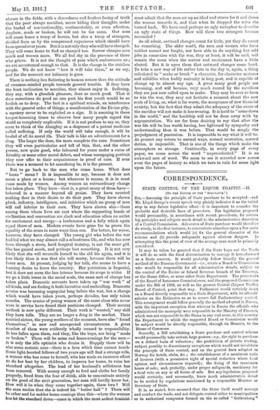" W E shall not know ourselves." This is the phrase
in which! simple people always predict great changes, and it is horribly realistic. The familiar is dear. Nevertheless the young often seek exhilaration in new surroundings. But if we come not to " know ourselves " we shall " feel strange " indeed. There are a few people of whom their acquaintance say that they are " always the same." Time, they mean, has no effect upon their characters. But for most of us the modifying effect of time is slow but great. If we could meet ourselves ten or fifteen years hence, we should probably experience a certain shock, and that shock would not necessarily be caused by the impact of a new environment. We might be in happier circumstances ; we should of course be older but it is not outward change which would strike us most imme- diately. For a moment we should feel that we did not " know ourselves." When we meet our friends after any long interval, we experience the same sensation ; or, if not, we are surprised and say : " It was delightful to see So-and-so—he seemed just the same," or we use another colloquial phrase and say : " We seemed to go on just where we left off." But these cases are rare, and fill us with relief.
When we move among great events the effects of time upon character are immeasurably accelerated. That is why we have all just now the feeling that " we do not know ourselves." Most of us are not yet sufficiently at home in the new times to make any moral criticism upon them. We know that they are changed; and we feel horribly strange. Our sons and our husbands and brothers will come back other than they went—or they will not come back. " It will make men of them," say the fierce elderly persons who must perforce stay at home in clubs and drawing- rooms. "It will make the boy or break him," says the father who
abours in the fields, with a shrewdness and fearless facing of truth that the poor always manifest, never hiding their thoughts under the bushel of conventionality, sentimentality, or even affection. Anyhow, made or broken, he will not be the same. Our sons will come home a troop of heroes, but also a troop of strangers, divided from us by the compressed experience which should have been spread over years. But it is not only they who will have changed. They will come home to find us changed too. Sorrow changes men much and women more. We all feel shy in the presence of those who grieve. It is not the thought of pain which embarrasses us ; we are accustomed enough to that. It is the change in the stricken people. We do not know " how it will take them," as we say, and for the moment our intimacy is gone.
There is nothing less flattering to human nature than the attitude of common-minded people towards general trouble. If they have the least inclination to moralize, they almost enjoy it. Suffering, they say, with a ghoulish pleasure, does so much good. That it does sometimes do good no one past his first youth would be so foolish as to deny. The fact is a spiritual miracle, an interference with the•general order of things, a manifestation of the Divine pity, a mystery never to be exploited as a sign. It is amazing in these tongue-loosening times to observe how many people regard the world as completely explicable. If it is not profane to say so, they seem to think of the Almighty as a dispenser of a patent medicine called suffering. If only the world will take enough, it will be healed of all its moral ills. Their talk is like an advertisement for a drug. The larger the dose, the more complete the cure. Sometimes they will even particularize and tell of this, that, and the other person, now quite good, who laboured for years under a curse of frivolity or some other moral defect, and whose unengaging portrait they now offer to their acquaintance in proof of cure. If ever there was a moment to let moralizing be, it is the present.
But to go back to the men who come home. What does " home " mean It is impossible to say, because it does not mean a place or a house ; but whatever it means, it is in most cases made by women. Among women an extraordinary change has taken place. They have—that is, a great many of them have— behaved in a manner beyond all praise. They have counted nothing dear in their desire to do their part. They have shown pluck, industry, intelligence, and initiative which no group of men will call inferior to their own. They have shown also—those among them whose lives are cast where the supporting bonds of civilization and convention are slack and education offers no outlet for excitement and energy—a lawlessness and a folly which again equal those of men. Modern events have gone far to prove the equality of the sexes in more ways than one. For better, for worse, however, they have changed. The young girl who before the war had led what we may almost call a schoolroom life, and who has now been through a stern, hard hospital training, is not the same girl. She has gained much, and perhaps lost something. It is not very likely that she will reconcile herself to the old life again, and it is less likely than it was that she will marry, because there will be fewer men. At present, judging by her talk, she seems to have a burning desire to leave the country. Her patriotism is Imperial, but it does not seem the less intense because its scope is wider. If we go a little lower in the social scale, the same sort of change has taken place. Domestic servants have taken up " war work " of all kinds, and are finding it both lucrative and enthralling. Domestic service was becoming unpopular long before the war, but a change which would have taken years, perhaps decades, has only taken months. The armies of young women of the same class who never were in service have found their positions changed. Their mental outlook is now quite different. Their work is "wanted," any skill they have tells, They are no longer a drug in the market. Their married sisters, the young mothers of the moment, have also " found themselves," in new and unexpected circumstances. A great number of them were evidently wholly unused to responsibility. It has fallen upon them, and they, like the boys, are being " made or broken." There will be some sad home-oomings for the men— it is only the idle optimist who denies it. Happily there will be also some ecstatic ones—there is a love which time cannot touch- Some light-hearted fellows of two years ago will find a strange wife, a woman who has come to herself, who has made an immense effort to do her best by her children, to improve her home, to raise her standard altogether. The load of her husband's selfishness has been removed. With money enough to feed and clothe her family properly, freed from the fear of drink, able to concentrate entirely on the good of the next generation, her man will hardly know her How will it be when they come together again, these two ? Will tilse man realize that she is indeed his " better half " ? There will be other and far sadder home-comings than this—where the woman has let the standard down—cases in which the most ardent feminist must admit that the man set up an ideal and strove for it and drove the woman towards it, and that when he dropped the reins she turned back. We have used perhaps an ugly metaphor to describe an ugly state of things. How will these two strangers become reconciled ?
As all admit, outward changes count for little, yet they do count for something. The older world, the men and women who have neither nursed nor fought, nor been able to do anything but odd jobs in connexion with the war, they at least, it will be said, will remain the same when the sorrow and excitement have a little abated. But it is upon them that outward changes come hard. To take a new way of life rather late in the day is, again, a thing calculated to " make or break " a character, for character matures and solidifies when bodily maturity is long past, and is capable of change up to almost any age. A great many good people are becoming, and will become, very much soured by the sacrifices they are just now called upon to make. They may be ever so keen to win the war, they may not hesitate a moment about the new scale of living, or, what is far worse, the acceptance of new financial anxiety, but the fact that they admit the adequacy of the cause of the sacrifice will not make it less wearing. It is hard to "comedown in the world," and the hardship will not be done away with by argumentation. We are far from desiring to say that after the war life will be less worth having, less lightened by sympathy and understanding than it was before. That would bo simply the prejudgment of pessimism. It is impossible to say what it will be. At present any return to normal ways, normal recreation, normal duties, is impossible. That is one of the things which make the atmosphere so strange. Continually, in every page of every paper, we come across the word " unprecedented." It is an awkward sort of word. We seem to see it scrawled now across even the pages of history to which we turn in vain for some light upon the future.



























 Previous page
Previous page